Energy
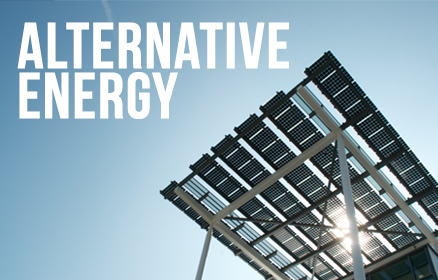
At LMU, we recognize that on campus energy use contributes to over 50% of our campus carbon footprint. To counter this, we have numerous energy conservation initiatives and a growing portfolio of Alternative Energy projects to directly reduce the Carbon Footprint of our built environment. For example, Loyola Marymount University has been installing solar panels since 2003 and now has approximately 90,000 square feet of solar panels, 8,846 panels, and approximately 1,335,172 kwh per year in clean energy for the campus. We have also spent great time, resources, and effort to reduce campus energy consumption through efficiency upgrades such as utilizing building management systems to maximize energy performance and minimize harmful emissions. Read more about Alternative Energy.
Water

Loyola Marymount University is located in Los Angeles, California. Our geographic location means that we are living in a water scarce area. We recognize the significance of conserving water and implementing alternative technologies to reduce our contribution to the south west's severe drought. Additionally, water use (specifically heating) can contribute to more than 15% of a building's energy use. Over the past few years, we have reduced our water use by over 20 %. For example, we have implemented numerous conservation programs and alternative systems to directly reduce our water use, such as increasing the use of reclaimed water on campus. We now source over 76% reclaimed water for irrigation. LMU also reduces campus water consumption efficiency by installing water saving devices such as 'green' toilets, shower heads, and faucets.
Waste

Loyola Marymount University prides itself on its waste reduction and recycling program. Landfill waste produces harmful gases like carbon dioxide and methane into the air which contributes to global climate change. Plastic waste is also extremely detrimental to our natural ecosystems, especially the ocean. Between 5.3 million and 14 million tons of plastic are dumped into the ocean annually. To combat this, LMU has comprehensive recycling and composting programs. We are one of the only campuses that has our own recycling plant, with a whole team dedicated to ensuring the productivity and accuracy of waste reduction. Since 1990, LMU's recycling plant has won numerous top finishes in Recyclemania contests, and we currently recycle over 75% percent of our waste. LMU also has composting programs that help to reduce our food waste in landfills.
Grounds
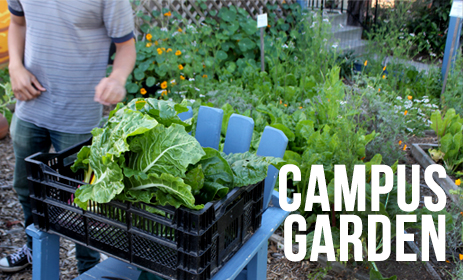
Campus grounds are extremely important in regards to sustainability. By picking plants that require less water, installing features that trap and filter water run off, planting trees that help sequester carbon, and having learning gardens that can teach the community about the advantages of local urban farming, LMU is actively participating in ways to ensure our grounds are as sustainable as possible, while still looking beautiful. LMU has comprehensive programs with campus gardens, and grounds/landscaping choices that allow the community to learn about and practice sustainable gardening and living.
Transport
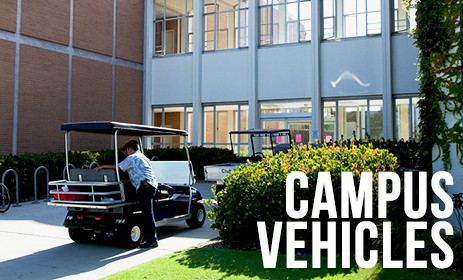
Transportation is a major contributor to greenhouse gas emissions and particulate pollution that damages air quality and influences climate change. The combustion of fossil fuels such as gasoline and diesel used in transportation is the second largest source of CO2 emissions, accounting for about 31% of the U.S. total. Recognizing this problem, LMU has numerous alternative transportation programs, including our on campus bike shop, to reduce single rider vehicle trips and encourage healthy commuting choices. Furthermore, we are committed to a cleaner campus fleet, with 68% of our transportation being electric carts and cars that run solely on electricity. This drastically reduces harmful emissions that impact the environment, while also reducing LMU's own carbon footprint.
Academics

Educating students and the surrounding communities about sustainability is vital to ensuring that LMU is the leader in cultivating environmental awareness and practices. A major part of sustainability at LMU is done through the curriculum and research that is done right on campus. There are numerous faculty members that contribute to initiatives and research that work to improve sustainability on campus and globally. The curriculum at LMU works to educate and create future leaders of environmentalism. Research done on campus and abroad contributes to finding global solutions to understand and advance the environmental movement. Creating an atmosphere of progressive environmental and sustainable thinking allows LMU to be a leader in sustainable policies on campus and around the world.
Lifestyle
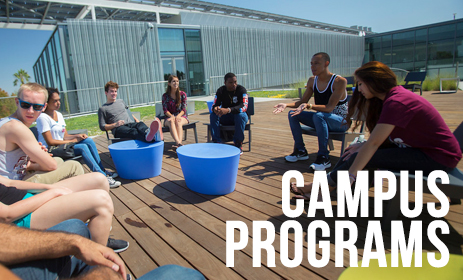
It is crucial to educate the community about the importance of sustainable practices and environmental living, which is done through the campus and community programs implemented at LMU. There are many ways to get involved both on campus and in the surrounding areas. Our campus boasts numerous outreach campaigns, wellness programs, outdoor clubs, environmental organizations, a green office certification program, and much more. There are also off campus volunteer outreach programs and collaborations with the broader community. These include education in sustainability and environmental justice efforts through interdisciplinary centers, programs in underserved neighborhoods, and off-campus facilities, such as schools, urban gardens and parks. All of these work toward elevating global environmental awareness and progress through LMU stewardship.
Purchasing
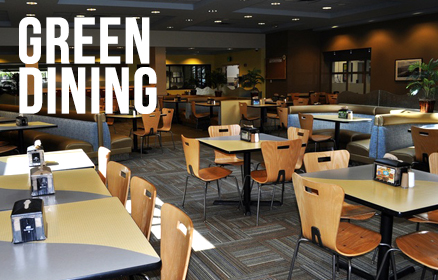
Purchasing has a large ecological impact, from the food that we source to the paper we use. The ethical treatment of animals and workers are an important consideration in all that we do at LMU. There are numerous eco and sustainability initiatives in our dining programs, like purchasing local seasonal produce whenever possible, to reducing inorganic and organic waste. In general, LMU has policies in place that ensures environmentally friendly product purchasing and energy and water efficient equipment purchases.
Buildings
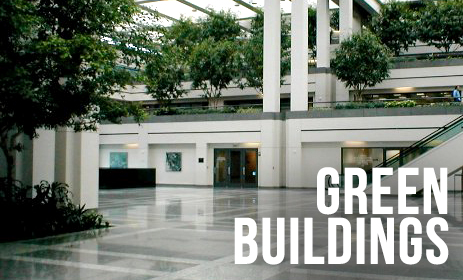
LMU recognizes the impact of putting sustainable ideologies into practice. In the United States, buildings account for 39 percent of total energy use, 12 percent of the total water consumption, 68 percent of total electricity consumption, and 38 percent of the carbon dioxide emissions. Knowing this, LMU strives to uphold their environmental standards through buildings that work to decrease overall emissions. There are currently numerous LEED certified green buildings on campus and a policy implemented that all new construction or major renovations must be LEED certified or equivalent, demonstrating our commitment to green and sustainable values. We make this same commitment through environmental considerations in our campus layout and function. Buildings with a sustainable design offer economic, environmental, and societal benefits. Some of these benefits include healthier, natural light which allow students and employees to perform better and improve overall moods.